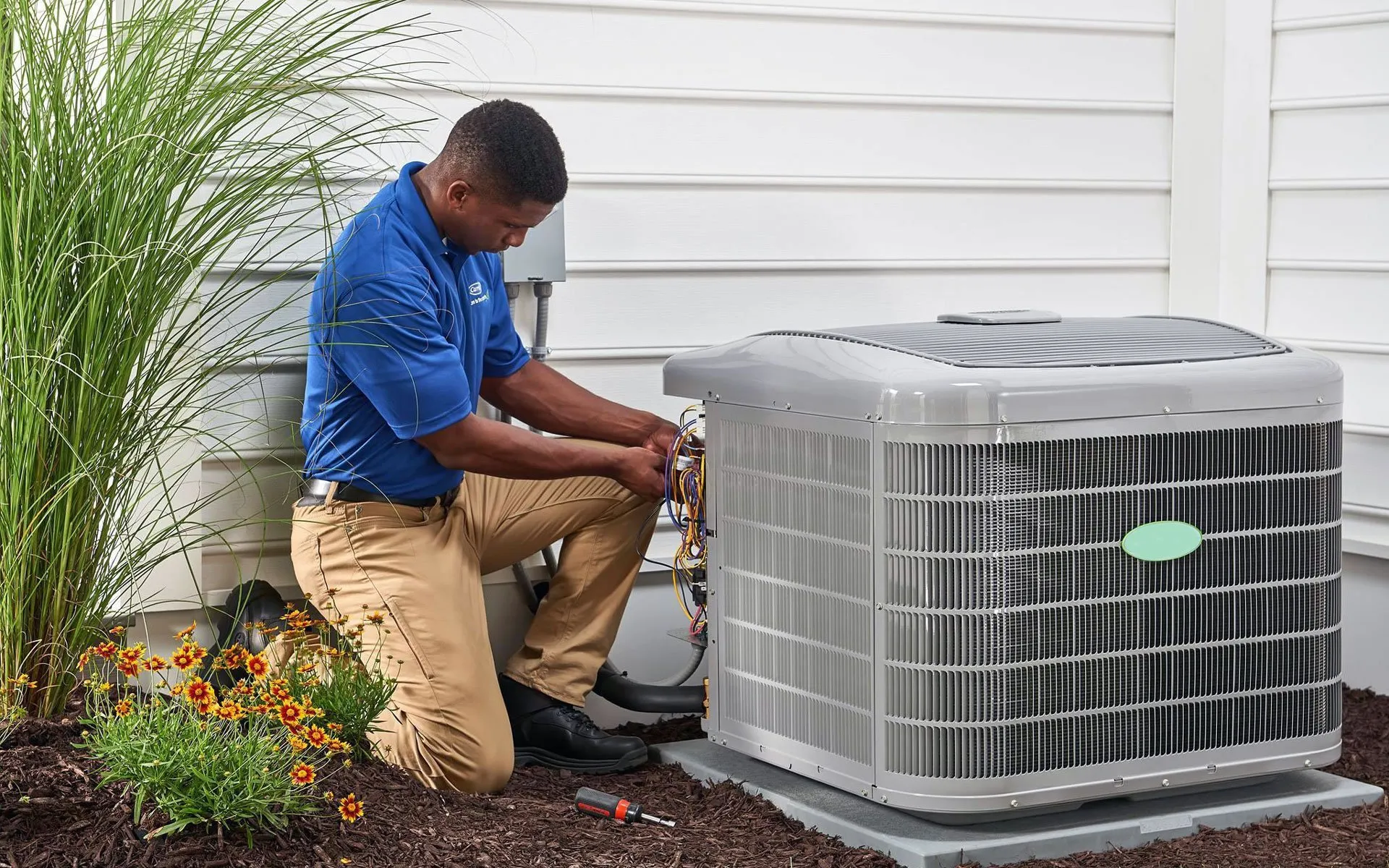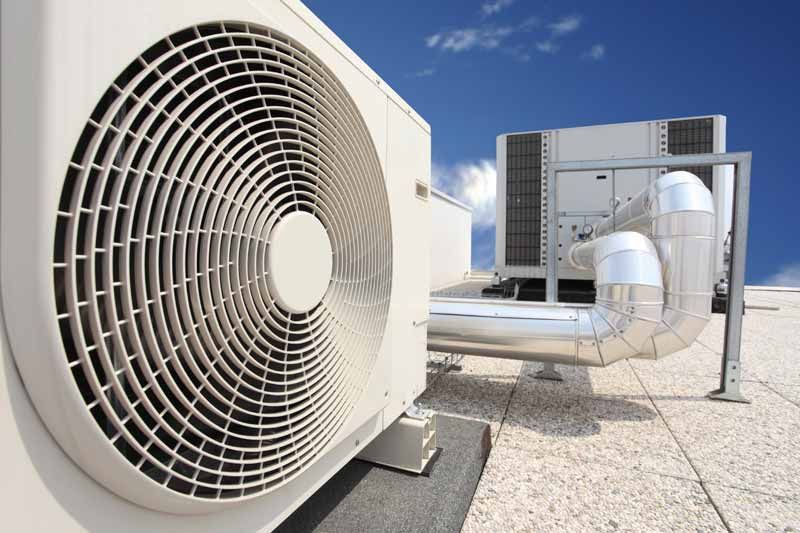Choosing In Between a Warmth Pump and Heater: Trick Factors To Consider for Your HVAC Demands
When examining heating alternatives for HVAC needs, the choice between a heatpump and a heater can be complex. Each system supplies distinct benefits customized to specific environments and energy efficiency objectives. Understanding these distinctions is crucial for making an educated selection. Key variables such as setup costs and ecological effect further complicate the selection procedure. Which option absolutely lines up with one's convenience and sustainability preferences? The adhering to areas will certainly check out these considerations in detail.
Recognizing Warm Pumps: Just How They Work and Their Advantages
While lots of homeowners consider different home heating options, recognizing how warm pumps function and their benefits can greatly influence their decision. Heat pumps run by transferring warm as opposed to creating it. In the winter, they draw out warm from the outdoors air or ground and move it indoors, while in the summer, they reverse this process, cooling down the home by eliminating heat outside. This double capability makes them functional for year-round climate control.One of the main benefits of warm pumps is their energy effectiveness. They make use of substantially much less power compared to standard heater, potentially resulting in lower energy expenses (furnace replacement). In addition, heatpump have a smaller sized carbon impact, making them an eco-friendly selection. They also call for less upkeep than standard systems, contributing to lasting cost financial savings. In general, comprehending the auto mechanics and advantages of heat pumps can help home owners make informed decisions regarding their home heating and cooling demands
Checking Out Furnaces: Kinds, Operation, and Advantages
Heating systems can be found in various types, consisting of gas, electric, and oil versions, each with unique functional mechanisms. Recognizing these distinctions is important, as they affect effectiveness and home heating efficiency. Additionally, furnaces supply various advantages, such as regular heat result and reliability in colder climates.
Kinds of Heating systems
Furnace can differ substantially in design and procedure, with furnaces being a prominent selection among house owners. There are a number of types of heating systems, each utilizing various fuel sources and modern technologies. Gas heating systems are usual, leveraging gas to produce warmth effectively. Electric furnaces, on the other hand, utilize electric resistance to generate heat, typically favored for their straightforward setup. Oil heating systems, while less common, are reliable in locations with minimal gas accessibility (heat pump replacement ooltewah tn). Furthermore, condensing heating systems make best use of power efficiency by catching and reusing exhaust gases. Each kind operates with a system of heat exchangers and ductwork to disperse cozy air throughout a home. Understanding the differences in between these heater types is essential for educated heating and cooling choices
Advantages of Furnaces
For house owners seeking trustworthy warmth throughout cold months, the advantages of heaters are considerable. Heating systems offer constant heating, making certain also temperatures throughout the home. They are especially efficient in extreme cool, typically surpassing heat pumps in cold conditions. Various kinds, including gas, electric, and oil furnaces, supply adaptability to fulfill diverse requirements and preferences.Furnaces likewise have a tendency to have reduced initial installation costs contrasted to warmth pumps, making them an extra accessible alternative for lots of. Their durable style adds to a much longer lifespan, with several units lasting over 15 years with proper upkeep. In addition, modern-day heaters are often outfitted with sophisticated modern technology for improved performance, which can lead to minimized energy bills. In general, heaters remain a reputable option for reliable home heating.

Energy Efficiency: Contrasting Warmth Pumps and Furnaces
When contrasting power efficiency in between warmth pumps and furnaces, the Seasonal Power Effectiveness Ratio (SEER) plays an important duty in identifying efficiency. Additionally, a functional cost analysis reveals the lasting financial ramifications of each system. Recognizing these elements can direct house owners in making notified choices about their heating services.
Seasonal Energy Efficiency Ratio
Power performance plays an essential duty in the decision-making process between warm pumps and furnaces, especially when taking into consideration the Seasonal Power Efficiency Ratio (SEER) This statistics actions the cooling efficiency of heat pumps over an entire cooling period, offering a standard method to assess performance. Greater SEER rankings indicate greater energy efficiency, converting to lower power usage and minimized utility costs. In contrast, heating systems are generally examined utilizing the Yearly Fuel Use Performance (AFUE) score, which mirrors heating efficiency. When comparing these 2 systems, house owners must focus on SEER scores for heat pumps, as they straight effect general power cost savings and environmental sustainability. A complete understanding of SEER can especially affect the long-lasting complete satisfaction and cost-effectiveness of the chosen a/c solution.
Functional Expense Evaluation
Comprehending the operational expenses linked with heatpump and blog here heaters is crucial for property owners examining their choices. Heatpump usually offer higher power effectiveness, converting electric energy into heat with very little waste. This leads to reduced regular monthly energy bills, especially in modest climates. Alternatively, typical heaters, specifically gas designs, might have lower ahead of time expenses but can incur greater operational expenditures with time because of sustain prices and effectiveness ratings.Moreover, warmth pumps can work as both heating and cooling down systems, possibly reducing the need for different cooling and heating units. While first financial investments for warm pumps may Home Page be greater, their lasting savings in power performance can make them a more affordable choice for several families. Mindful evaluation of neighborhood power rates is necessary to figure out the very best alternative.
Installment Prices: What to Expect for each and every Heating Unit
Installment costs for home heating systems can vary considerably in between heatpump and heaters, affecting home owners' decisions. Heatpump normally have higher in advance setup expenses, generally ranging from $3,500 to $8,000, depending on the system dimension and intricacy of installation. This includes the outside unit, indoor handling system, and needed ductwork modifications. Alternatively, heaters tend to have reduced initial prices, balancing between $2,500 and $6,000, which can be appealing for budget-conscious home owners. Nonetheless, installation costs can boost if substantial ductwork is required.Moreover, the choice of gas kind for heaters-- gas, propane, or electrical-- can additionally affect installment expenses. While heatpump offer power effectiveness, their first investment might discourage some purchasers. Ultimately, examining setup costs along with long-term savings and effectiveness will certainly aid homeowners in making informed decisions concerning their heating unit.
Climate Factors To Consider: Which System Performs Much Better in Your Area
Exactly how do environment conditions affect the effectiveness of home heating systems? The efficiency of heatpump and heating systems can differ substantially relying on the local environment. In modest environments, heat pumps succeed by efficiently moving heat from the outside air, making them an energy-saving alternative. Their performance lessens in very cool temperatures, where they might struggle to draw out enough warm. Conversely, heating systems, specifically gas models, provide dependable and constant warm no matter of exterior problems, making them preferable in colder regions.In locations that experience milder winters months, heatpump can run properly year-round, offering both cooling and heating. In comparison, regions with harsh winters typically profit from the toughness of heating systems. Ultimately, understanding the neighborhood climate is crucial when choosing between a heatpump and a heating system, as it straight influences their functional effectiveness and overall efficiency.
Upkeep Requirements: Long-Term Treatment for Heat Pumps vs. Furnaces
While both heatpump and furnaces call for regular upkeep to ensure peak efficiency, their specific demands and care routines differ considerably. Furnaces typically need less their website constant interest, with yearly assessments being enough to check for gas leakages, clean filters, and evaluate total capability. Their easier style frequently permits straightforward repairs.In contrast, warm pumps require biannual upkeep due to their dual duty in home heating and cooling. This includes cleaning coils, inspecting cooling agent levels, and ensuring that both the outside and indoor systems work at their finest. Additionally, heatpump maintenance often entails more complex parts, making professional maintenance essential.Neglecting maintenance can bring about reduced effectiveness and enhanced energy expenses for both systems. Inevitably, homeowners should consider these lasting care requirements when choosing in between a warm pump and a heater, as positive upkeep can extend the life expectancy and performance of either system significantly.
Ecological Impact: Choosing a Lasting Heating Alternative
The environmental influence of furnace is a crucial assessment for homeowners seeking sustainable alternatives. Heatpump are normally much more energy-efficient than standard furnaces, as they transfer warmth instead of produce it, considerably reducing carbon exhausts. By making use of renewable resource resources, such as air-source or geothermal heat pumps, home owners can further decrease their environmental footprint.On the various other hand, all-natural gas furnaces release greenhouse gases and add to air pollution, though they frequently supply greater warm output. Improvements in technology have led to the development of high-efficiency heating systems that minimize emissions.Ultimately, selecting a home heating system entails considering efficiency versus environmental impact. Homeowners are encouraged to mirror on neighborhood energy sources and rewards for renewable systems, guaranteeing an option that straightens with both personal convenience and environmental responsibility. The choice affects not only instant convenience yet likewise long-term sustainability and environmental health and wellness.
Regularly Asked Questions
The Length Of Time Do Warm Pumps and Furnaces Usually Last?
The lifespan of heatpump usually ranges from 15 to 20 years, while heaters can last in between 15 to 30 years. Normal maintenance considerably influences their longevity and effectiveness in providing heating options.
Can I Use a Warm Pump in Exceptionally Cold Climates?
Heat pumps can run in extremely chilly environments, but their performance decreases as temperature levels decrease. In such conditions, extra heating sources may be essential to preserve comfortable indoor temperatures and assure peak performance.

What Is the Noise Level of Heat Pumps Versus Furnaces?
The sound degrees of heatpump and heating systems vary considerably. Generally, heatpump operate even more silently than typical heaters, making them preferable for those conscious sound, while heating systems may produce louder operational sounds throughout heating cycles.
Are Heat Pumps Suitable for Both Home Heating and Cooling?
Heatpump are indeed ideal for both home heating and air conditioning (heat pump installation ooltewah tn). They operate by moving warm, providing reliable temperature level control year-round, making them a versatile selection for home owners seeking an all-in-one a/c service
What Dimension Heating Unit Do I Need for My Home?
Figuring out the ideal size heating unit for a home needs reviewing aspects such as square video footage, insulation top quality, neighborhood climate, and the home's format. Consulting a specialist can guarantee an accurate evaluation and optimal convenience. Heat pumps typically offer higher energy performance, converting electric power into warm with very little waste. In moderate environments, warm pumps excel by efficiently moving heat from the outdoors air, making them an energy-saving option. Conversely, heaters, specifically gas models, supply constant and reputable warmth regardless of outdoor problems, making them preferable in colder regions.In areas that experience milder winters, heat pumps can operate efficiently year-round, providing both home heating and cooling. Warm pumps are typically extra energy-efficient than conventional heaters, as they transfer warm rather than create it, substantially minimizing carbon emissions. By using renewable power sources, such as geothermal or air-source heat pumps, home owners can better minimize their eco-friendly footprint.On the other hand, all-natural gas furnaces produce greenhouse gases and contribute to air pollution, though they commonly provide higher warmth output.